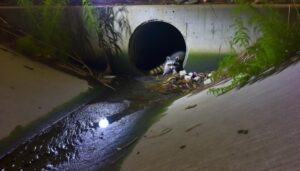How Long Can a Raccoon Live in a Trap Safely?
A raccoon's survival time in a trap is influenced by access to food and water, environmental conditions, and stress levels. Without food and water, a raccoon may decline rapidly, suffering from dehydration and metabolic failure within a day or two.
Temperature extremes can further reduce survival, with high temperatures causing heat stress and low temperatures causing hypothermia. Chronic stress from confinement also significantly impacts their health.
Legally, trapped raccoons should be released within 24 hours to prevent undue suffering. For humane wildlife management and more intricate details on the factors affecting raccoon survival in traps, further information is available.
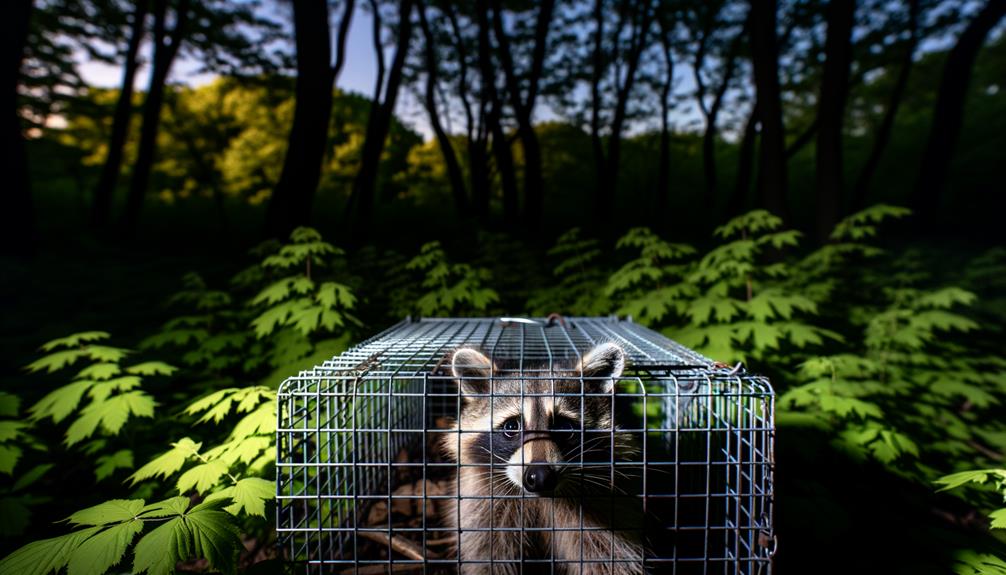
Key Takeaways
- Raccoons should not be kept in traps for more than 24 hours due to legal and humane considerations.
- Lack of food and water can lead to rapid physiological decline, making prolonged confinement fatal.
- Temperature extremes and exposure to elements can significantly impact a raccoon's survival in a trap.
- High stress levels from confinement can severely impair a raccoon's health and well-being.
- Regular monitoring and timely release are crucial to ensure the raccoon's survival in a trap.
Factors Affecting Survival
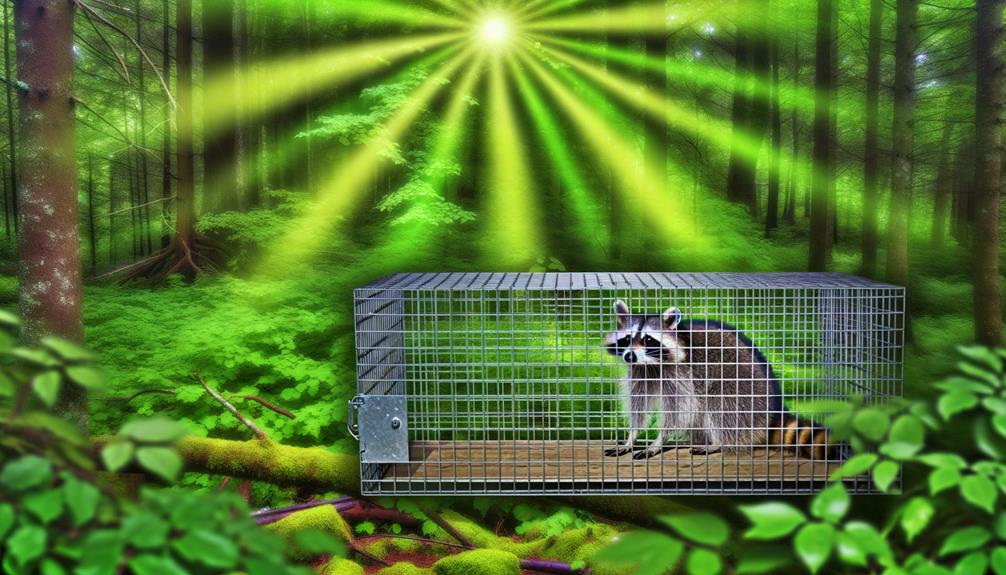
The survival of a raccoon in a trap is primarily influenced by factors such as access to food and water, environmental conditions, and the duration of confinement.
Adequate access to food and water is vital as raccoons, like other mammals, require sustenance to maintain their metabolic functions and hydration levels. Deprivation of these essentials can lead to rapid physiological decline.
The duration of confinement plays a pivotal role; extended periods without the ability to forage or hydrate can exacerbate stress and lead to fatal outcomes.
Additionally, the type of trap used may impact the raccoon's ability to move and access any available resources, further influencing survival rates.
Understanding these factors is essential for humane wildlife management practices.
Environmental Conditions
Environmental conditions play a crucial role in determining the survival duration of a raccoon in a trap. Temperature extremes, whether excessively hot or cold, can have a significant impact on the animal's health. The availability of shelter from elements such as rain or snow can mitigate stress and exposure risks.
Additionally, humidity levels can affect the raccoon's hydration status and overall physiological well-being.
Temperature Extremes Impact
Extreme temperature fluctuations can greatly impact the health and survival of a raccoon confined in a trap. Exposure to high temperatures can lead to heat stress, dehydration, and potentially fatal heatstroke. Conversely, low temperatures can cause hypothermia, frostbite, and diminished physiological functions. The impact of these temperature extremes is critical to understand for those involved in trapping and wildlife management.
| Temperature Range | Potential Effects on Raccoon |
|---|---|
| Above 85°F (29°C) | Heat stress, dehydration |
| Above 95°F (35°C) | Heatstroke, potential death |
| Below 32°F (0°C) | Hypothermia, frostbite |
| Below 20°F (-7°C) | Severe hypothermia, death |
| Best 60-75°F | Minimal stress, normal behavior |
Maintaining a raccoon in conditions outside its most favorable temperature range can significantly reduce its chances of survival.
Shelter From Elements
In addition to temperature extremes, exposure to rain, snow, and direct sunlight can worsen the stress and health risks faced by a raccoon in a trap. Prolonged exposure to precipitation can lead to hypothermia, while direct sunlight can cause hyperthermia and dehydration.
The lack of adequate shelter from these elements subjects the raccoon to fluctuating environmental conditions, which can weaken its physiological state. Moreover, a wet or overly hot environment can increase susceptibility to infections and other health complications by compromising the animal's immune response.
Providing shelter or placing the trap in a location that offers natural protection from adverse weather conditions is essential for minimizing these risks and ensuring the humane treatment of the trapped raccoon.
Humidity Levels Effect
High humidity levels can worsen the stress experienced by a trapped raccoon by creating a damp environment that supports the growth of mold and bacteria. This increased microbial activity can compromise the raccoon's respiratory health and skin integrity, leading to infections and disease.
Moreover, excessive moisture can result in increased discomfort and dehydration, as raccoons are unable to regulate their body temperature effectively in such conditions. The combination of these factors can greatly reduce the raccoon's chances of survival if not addressed promptly.
It is important to take into account local humidity levels when trapping raccoons and to implement measures such as proper ventilation and regular monitoring to mitigate these adverse effects and ensure humane treatment.
Access to Food
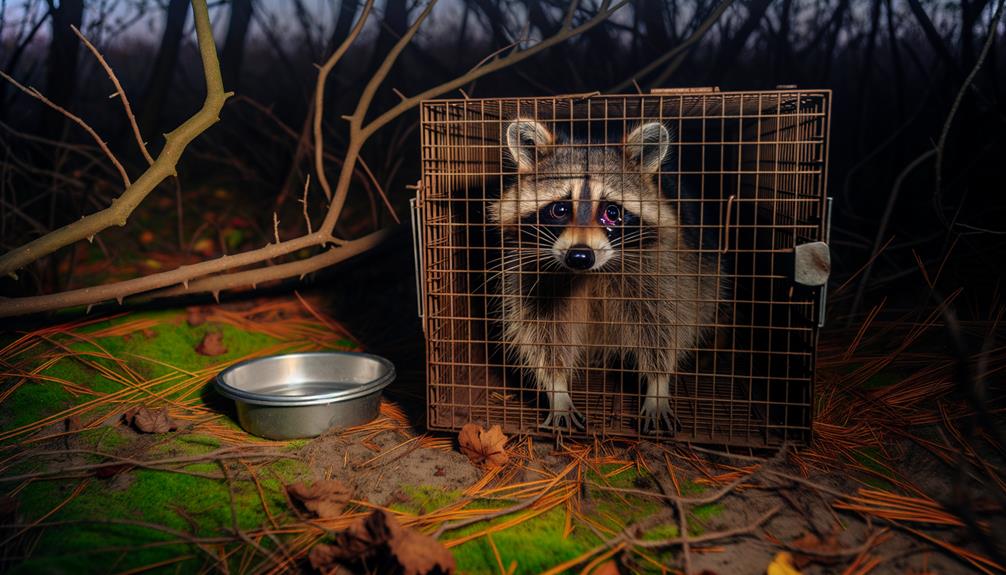
Access to food is a crucial factor influencing the survival duration of a raccoon trapped in an enclosure. The animal's nutritional requirements must be met to maintain physiological functions, while water availability is essential to prevent dehydration.
Additionally, stress factors induced by captivity can greatly impact the raccoon's ability to utilize available resources effectively.
Nutritional Requirements
Adequate nutrition is essential for raccoons confined in traps to prevent malnutrition and support basic physiological functions. Raccoons are omnivorous, requiring a balanced diet that includes proteins, fats, carbohydrates, vitamins, and minerals.
Protein sources such as insects, small mammals, or commercially available animal feeds are important for maintaining muscle function and overall health. Carbohydrates derived from fruits, vegetables, and grains provide necessary energy, while fats are essential for energy storage and cellular functions.
Additionally, vitamins and minerals, found in a varied diet, are necessary for immune system support and metabolic processes. Ensuring that trapped raccoons receive a diet meeting these nutritional requirements is crucial to their short-term survival and well-being until they are released.
Water Availability
Securing a consistent supply of clean water is crucial for maintaining the health and hydration of raccoons confined in traps. Dehydration can occur rapidly, especially in stressful conditions, leading to severe physiological impairments.
Adequate hydration supports metabolic processes, thermoregulation, and waste elimination, which are essential for the raccoon's survival. In the absence of clean water, raccoons may suffer from kidney dysfunction, lethargy, and impaired cognitive function.
It is recommended that water be provided in a spill-proof container to prevent contamination and ensure availability. Regular monitoring and replenishment are necessary to maintain peak hydration levels.
Failure to provide sufficient water can greatly reduce the raccoon's chances of surviving the confinement period in the trap.
Stress Factors
Proper nutrition is vital for minimizing stress in raccoons confined in traps, as it directly influences their energy levels, immune function, and overall well-being. Inadequate access to food leads to heightened stress responses, manifesting as increased agitation, weakened immunity, and rapid depletion of energy reserves.
The absence of food disrupts metabolic processes, exacerbating the physical and psychological strain on the trapped animal. Prolonged food deprivation can result in severe malnutrition, further compromising the raccoon's health and survival chances.
Ensuring that a trapped raccoon has access to adequate nutrition is essential for mitigating stress and enhancing its resilience. This approach not only supports the animal's immediate health but also facilitates humane treatment and ethical wildlife management practices.
Availability of Water
Access to water is vital for the survival of a raccoon confined in a trap, as dehydration can set in quickly without an adequate water source. Raccoons, like all mammals, require water for essential physiological processes, including thermoregulation, digestion, and cellular function.
In a confined space, the availability of water becomes even more essential because the animal cannot seek hydration independently. Dehydration can lead to severe health issues such as kidney failure, decreased blood volume, and impaired thermoregulation. Generally, raccoons can survive a few days without water; however, the exact duration depends on environmental conditions and the individual's health status.
Providing a water source within the trap can mitigate the risk of dehydration and improve the raccoon's overall welfare during confinement.
Stress Levels
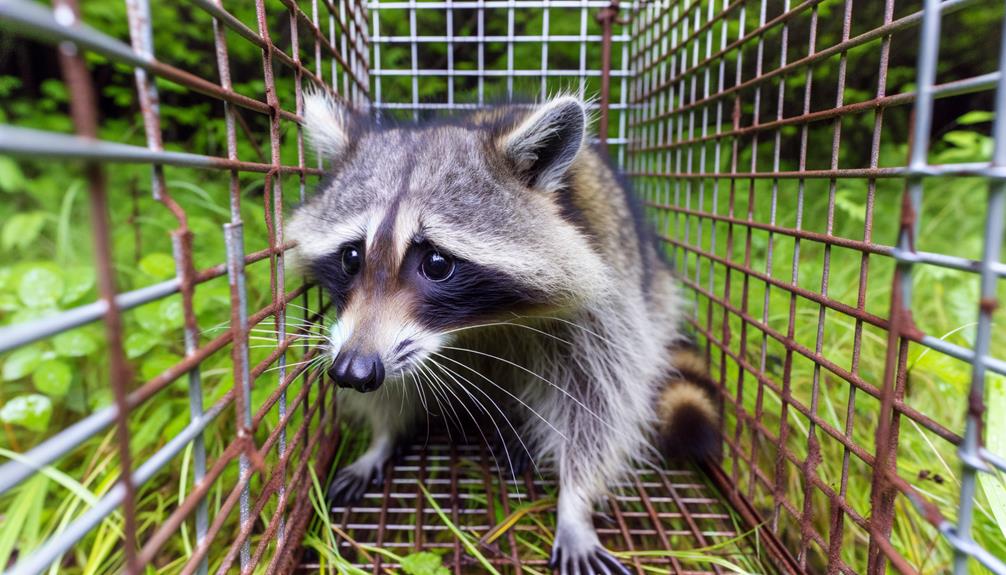
Elevated stress levels in raccoons confined in traps can greatly impact their physiological and psychological well-being, leading to adverse health outcomes.
Chronic stress triggers the release of glucocorticoids, which can suppress the immune system, making raccoons more susceptible to infections. Prolonged exposure to stress may also result in behavioral changes, such as increased aggression or lethargy.
Additionally, confined raccoons often exhibit stress-induced hyperthermia and tachycardia, putting significant strain on their cardiovascular systems. These physiological responses can exacerbate existing health issues or precipitate new conditions.
Stress can also impair cognitive functions, affecting the raccoon's ability to forage or evade predators after release. Minimizing stress is essential for the humane and effective management of trapped raccoons.
Legal Considerations
Considering the significant stress-related health implications for raccoons in traps, it is vital to understand the legal requirements governing their capture and confinement. Regulatory frameworks vary by jurisdiction but generally mandate humane treatment and timely release of captured wildlife.
Many regions stipulate a maximum duration for which an animal can be held in a trap, often less than 24 hours, to minimize distress. Additionally, specific guidelines may exist for the type of traps permitted and the handling procedures post-capture.
Non-compliance with these regulations can result in legal penalties, emphasizing the importance of adherence. Understanding these legalities is essential for ensuring ethical wildlife management and safeguarding the well-being of raccoons during trapping operations.
Humane Trapping Tips
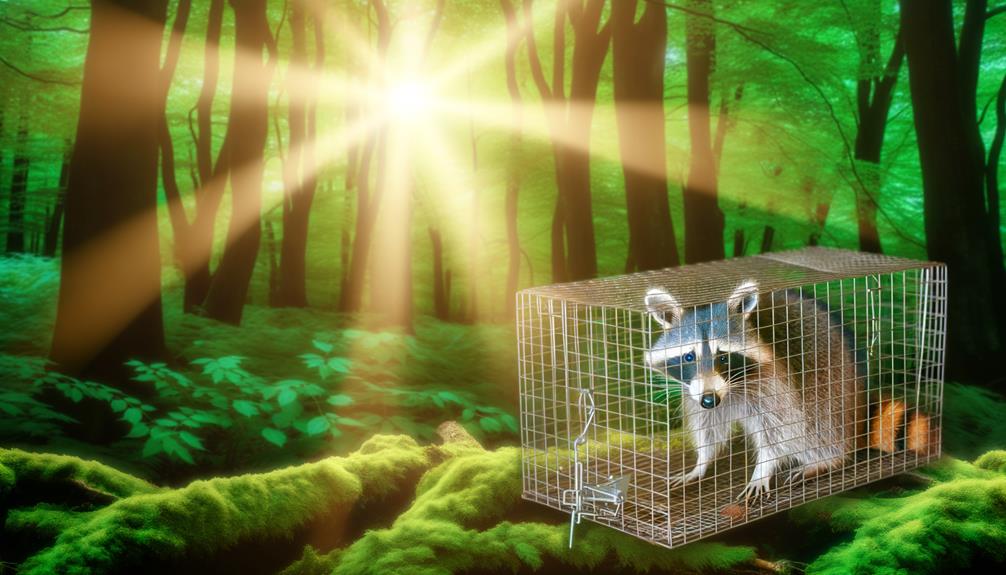
Implementing humane trapping techniques is essential to minimize stress and injury to the raccoon while ensuring effective capture. To achieve this, it is critical to take into account various factors that contribute to a more humane approach.
- Proper Trap Size: Make sure the trap is spacious enough for the raccoon to move comfortably.
- Bait Selection: Use appealing yet non-toxic bait to lure the raccoon.
- Frequent Monitoring: Check the trap regularly, ideally every few hours, to minimize the raccoon's time in captivity.
- Shade and Shelter: Place the trap in a shaded location to protect the raccoon from extreme weather conditions.
- Calm Handling: Approach and handle the trap carefully to prevent causing additional stress to the trapped animal.
These steps help maintain the raccoon's welfare during the trapping process.
Conclusion
The longevity of a raccoon in a trap hinges on various factors including environmental conditions, access to food and water, stress levels, and legal considerations. Without sustenance, a raccoon may only survive a few days, akin to a candle flickering out.
Ensuring humane trapping practices is paramount to mitigate unnecessary suffering. By addressing these determinants, the welfare of trapped raccoons can be better managed, aligning with ethical wildlife management principles.




